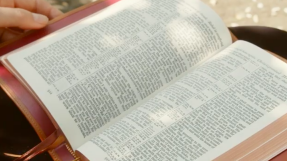
A third of global food production is either wasted or lost. This is one of the startling facts that the UN-sponsored World Environment Day on June 5th seeks to bring to our attention. Apparently, every year 1.3 billion tonnes of food goes to waste in a world where one in eight people go to bed hungry.
Christians have not always been very good at fitting environmental concerns into our thinking. In this regard, the growing Green movement presents a profound challenge with its emphasis on sustainable farming, greenhouse gases, global warming, deforestation, pollution and the like. It begs the question: was Jesus an environmentalist? He may not appear so from today's definition of the term, but he did use frequent illustrations concerning food, agriculture and nature. He was also clearly under no illusions regarding his perception of human greed and exploitation of this world's resources for selfish ends.
Environmental issues certainly should be of concern to Christians, although our starting point may be somewhat different. The Christian begins with the premise that the earth is God's, not ours. We are stewards of His Creation, not masters. Humankind's instruction from God in Genesis to "fill the earth and subdue it" was in no way a blank cheque for greedy exploitation and "asset stripping", but for responsible management and stewardship. If we see the planet as merely a mass of raw materials for economic growth, then inevitably we will make a desert of it. The environmental crises that we now face in our world stem from the mistaken assumption that this planet is ours to do what we like with, instead of recognising that our role is to look after what God has made.
The roots of environmental and ecological pollution lie in humankind's broken relationship with God. But the often-neglected dimension of God's salvation message in the Bible is that God's intention is not just to save human beings; he desires to save creation. He will one day create a new heaven and a new earth to restore the universe to the condition that He originally intended. Salvation is ultimately going to embrace all of nature. It is not simply about how to escape earth and "bag a place in heaven".
Understanding these truths should give us a different slant on environmental issues. On the one hand, we are not to be disconnected from God's created world, considering it to be of no importance or relevance in God's economy. On the other hand, neither should we fall into the trap of becoming besotted with the environment to the extent that saving the rhino in Africa, or reducing our carbon footprint becomes virtually a militant religion in its own right. The right balance in our stewardship entails worshipping the Creator, not the created. Personally, I share many of the concerns expressed by environmental pressure groups. My African background fuels my deep concern that poachers are eradicating all the rhinos in Africa in barbaric fashion in order to feed a lucrative trade in rhino horn. Such inexcusable destruction and savagery is, to quote Bishop James Jones, not only a crime against humanity, but it is a blasphemy because it undoes the creative work of God in Christ.
It is this recognition that primarily motivates Christian environmental concern – that we are accountable to God, rather than merely the cause of self-preservation. It is not Mother Earth who needs to be appeased, but it is Father God whose Creation and redemptive purposes for both humanity and nature need to be respected and responded to with appropriate faith and stewardship. We treat the environment not only according to what we believe about it, but also according to what we believe about our Creator God. With that perspective, the wonderful thought for the Christian is that, one day, we and all creation will be restored to God's original perfection.
Tony Ward is a Bible teacher and evangelist who was ordained in Zimbabwe. He ministers mainly in Cardiff and Bristol.













